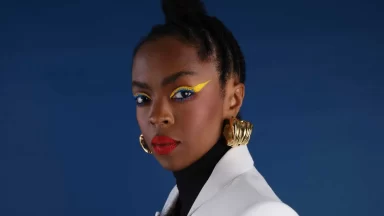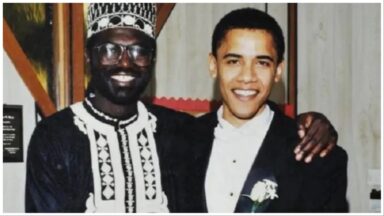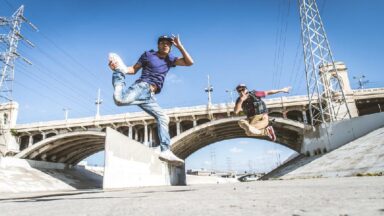By Viviane Faver
Amid so much adversity, two community leaders do their best to reverse these problems. Salma Simeus, resident of the Onaville village, north of Port-au-Prince; and Pauline Juma, who lives in Kibera, Nairobi, tell us how they help their communities and set an example of overcoming and persistence.
Salma Simeus
Salma is a survivor of a magnitude 7 earthquake, which left more than 300 dead on the island on January 12, 2010. After the tragedy, he began to lead the community, working to rebuild the affected sites. “My brother was a deputy and this made it easier to collect supplies for distribution. Since then, I have become a volunteer. Because I knew people’s needs up close, I made this bridge for foreign ORGs, facilitating the work. My first action, right after the earthquake, was to create and define the streets of Onaville that were destroyed.”
From that moment on, he started to do awareness work, showing how important it was for the community to engage, civically and socially. “This was very good for my intellectual development. Helping organizations, I received training and quickly learned what was only possible in college years ”.
Strengthen Mental Health by Embracing Culture
In the coronavirus phase, Simeus taught the community how to use the “Tiptape” project, which besides being useful in the pandemic, helps to save water. “It is a very simple mechanism in which we don’t need to touch anything to be able to wash our hands. As soon as the crisis started, I placed it at strategic points in my community and focused on orphanages. Hundreds of people already benefit from access to water, as not everyone can buy gel alcohol. My dream is to expand and reach the entire community, which is divided into 15 blocks (our neighborhoods) ”.
Salma Simeus created the “Tiptape“: a mechanism made of wood, string, and nails, for the community to wash their hands without touching anything. According to Simeus, there are 42 thousand inhabitants who face difficulties in infrastructure, streets without asphalt, lack of access to water, electricity, safety, health and environmental vulnerability problems, such as earthquakes.
Pauline Juma
Pauline Juma is mother of two boys and founder of the ORG “Rebirth of a Queen” for women who suffer domestic violence, rape, among other situations that affect mental health.
According to her, since the beginning of the pandemic, one in four women in Kibera slum has experienced sexual violence, especially teenagers.
To provide assistance, the institution created a center that offers psychological support and basic care, with volunteers who go to the victims’ homes and do routine monitoring.
The ORG, which keeps on donating friends, was created in 2017 with the aim of promoting self-confidence and training girls in communication skills. “In the beginning it was a small group and talked about violence against women in an indirect way, using poetry to express fear, anxiety, and the pain of survivors. I told my own story of sexual violence and, from there, many started to open up and we formed a therapy group”, says Pauline Juma.
At 16, Pauline was raped by a gang and, at 19, suffered domestic violence after an early marriage. All of this could have made her revolt with life and go into a deep depression. Instead, she looked for a way to help women who are going through similar situations.
“We also have a group that supports survivors, encouraging, supporting and strengthening women’s self-esteem, in addition to distributing intimate tampons to more than 500 girls and food to 100 families. In May, we rescued 60 vulnerable girls ”.
And it won’t stop there: Pauline Juma dreams of having an art therapy school for women in Kenya. “In five years, I would like to see ‘Rebirth of a Queen’ as a transformative center – fragile girls come in, more powerful women come out, both economically and socially, to help victims fight for their rights.”
As well as individual attitudes of born leaders, agencies focused on voluntary aid are also having to reinvent themselves. That is the case of the agency“Volunteer Vacations (VV)”, which operates in 26 countries in partnership with institutions, ORGs, and humanitarian aid agencies.
According to one of the founders, Mariana Serra, the most significant difficulty with the coronavirus crisis is the lack of money given that donations have been suspended. As a solution the ORG created crowdfunding.
“We enumerated the main needs of the communities and created a new way of acting: financially sponsoring a social initiative or a local leader. We have plans of 1, 3 or 6 months, with help from R $ 3 per day, and we set up the planning. With this we are able to control and measure the entire result of the action. We have projects that need help from management skills, social media, women’s empowerment, to classes and pedagogical initiatives,” says Mariana.
VV works in different communities and always with local leaders, who become partners, giving the list of people’s needs. “Each country has its obstacle, but the main one is usually the lack of resources, especially financial, and it also has unhealthy conditions, which increases the spread of diseases. In conflict countries, on the other hand, the difficulties are those of logistics, entry, development and execution of the project itself ”, concludes Mariana.



Recent Comments